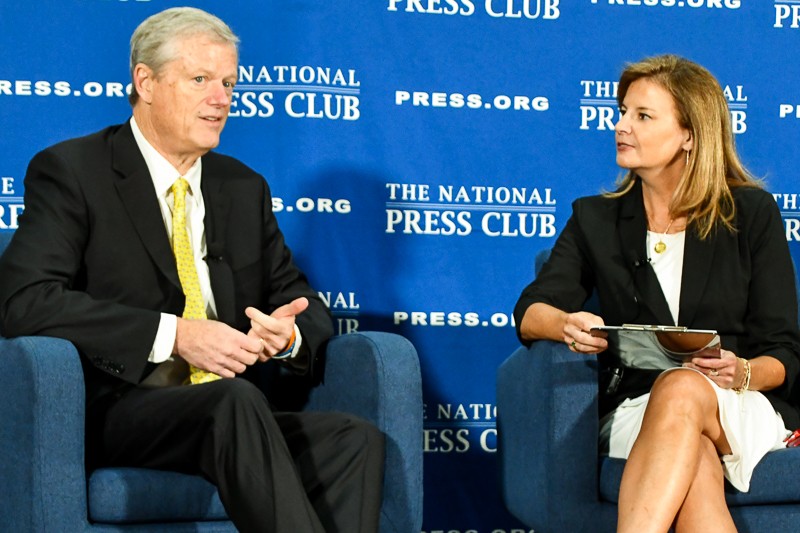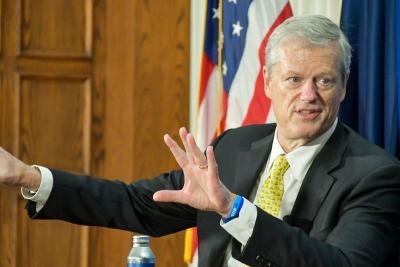NCAA president defends court settlement and new rules for Division I college athletes

Premier male and female athletes will benefit from the new court settlement that upends college sports like never before, National Collegiate Athletic Association President Charlie Baker told a National Press Club audience at a Headliners Breakfast event July 24.
Baker said the legal framework implemented by a federal judge provides transparency and clarity for students, who previously were navigating a murky landscape of promises and hype.
“I like the fact that there is now a process. I like that a lot,” Baker said.
“It will give parents and families and kids some idea of what is real and what is not … more data and more process accountability than ever before,” added Baker, a college basketball player and former governor of Massachusetts who took over the NCAA in 2023.
Baker touched on a variety of topics related to college sports during the wide-ranging conversation, including issues of transgender athletes, sports betting, Title IX funding, the transfer portal and the possibility of President Donald Trump issuing an executive order mandating changes to college sports.
The event coincided with the July 1 implementation of dramatic new regulations imposed by a court settlement on the way Division I college athletes can be compensated. (It does not apply to Division II or III athletes.)
The federal antitrust settlement grew out of a case filed by former college athletes who claimed they should have been paid for their participation in sports. The settlement gives those players back pay, and establishes a framework going forward that allows for direct payments to athletes.
While the payments up-end a bedrock principle of amateur collegiate sports, other rulings had previously undone much of the traditions by allowing, since 2021, athletes to profit off their name, image and likeness -- sponsoring car dealerships, local diners or in some cases signing multimillion-dollar shoe or gear endorsement deals.
The court settlement demands $2.8 billion from the NCAA and the top collegiate conferences, with about $20 million a year available to each college or university to share with their players. Some colleges say they will need to increase sports event ticket prices to raise this extra money to pay their players.

This money doesn’t prevent individual schools from paying even more money to star athletes, with some colleges now offering their top quarterbacks $2 million a year to compete (in addition to their scholarship and free tuition and room and board). Extra payments could go to swimmers or gymnasts or tennis players or any sport's athletes, but it's football and basketball that generate the most revenue.
“Boosters can give extra money beyond what the university is giving,” Baker noted, admitting that some college sports programs will become even more powerful with all the extra cash available to recruit top players.
Separately, Baker said he favors expanding the March NCAA basketball tournament beyond the current 68 teams, saying: “Every year there are good teams that don’t get in the tournament … . Cinderellas aren’t supposed to win but sometimes they do,” though skeptics say there already are too many marginal teams on the bubble and it’s simply a money grab by the NCAA to consider a broader field of teams entering the post-season competition.
Baker claimed powerlessness over the “transfer portal,” which also has reshaped college sports by allowing in-demand players to go from team to team like pro players — something that encourages coaches to be short-sighted and reduces the odds of dynasties or teammates playing together for all four years of a traditional undergraduate degree program.
The discussion was moderated by NPC Board of Governors member Tara Copp, The Washington Post’s Pentagon correspondent (who just started working at the Post this week) and a longtime Texas sports fan, who refrained from asking even a single question about UT.
